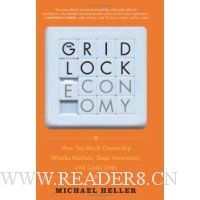基本信息·出版社:Basic Books ·页码:304 页 ·出版日期:2008年07月 ·ISBN:0465029167 ·条形码:9780465029167 ·装帧:精装 ·正文语种:英语 ...
| 商家名称 |
信用等级 |
购买信息 |
订购本书 |
|
|
 |
The Gridlock Economy: How Too Much Ownership Wrecks Markets, Stops Innovation, a |
 |
|
 |
The Gridlock Economy: How Too Much Ownership Wrecks Markets, Stops Innovation, a |
 |

基本信息·出版社:Basic Books
·页码:304 页
·出版日期:2008年07月
·ISBN:0465029167
·条形码:9780465029167
·装帧:精装
·正文语种:英语
内容简介 在线阅读本书
25 new runways would eliminate most air travel delays in America. Why cant we build them? 50 patent owners are blocking a major drug maker from creating a cancer cure. Why wont they get out of the way? 90% of our broadcast spectrum sits idle while American cell phone service lags far behind Japans and Koreas. Why are we wasting our airwaves? 98% of African American-owned farms have been sold off over the last century. Why cant we stop the loss? All these problems are really the same problem-one whose solution would jump-start innovation, release trillions in productivity, and help revive our slumping economy. Every so often an idea comes along that transforms our understanding of how the world works. Michael Heller has discovered a market dynamic that no one knew existed. Usually, private ownership creates wealth, but too much ownership has the opposite effect-it creates gridlock. When too many people own pieces of one thing, whether a physical or intellectual resource, cooperation breaks down, wealth disappears, and everybody loses. Hellers paradox is at the center of The Gridlock Economy. Todays leading edge of innovation-in high tech, biomedicine, music, film, real estate-requires the assembly of separately owned resources. But gridlock is blocking economic growth all along the wealth creation frontier. A thousand scholars have applied and verified Hellers paradox. Now he takes readers on a lively tour of gridlock battlegrounds. Heller zips from medieval robber barons to modern-day broadcast spectrum squatters; from Mississippi courts selling African-American family farms to troubling New York City land confiscations; and from Chesapeake Bay oyster pirates to todays gene patent and music mash-up outlaws. Each tale offers insights into how to spot gridlock in operation and how we can overcome it. The Gridlock Economy is a startling, accessible biography of an idea. Nothing is inevitable about gridlock. It results from choices we make about how to control the resources we value most. We can unlock the grid; this book shows us where to start.
作者简介 ~Michael A. Heller is Vice Dean for Research and Lawrence A. Wein Professor of Real Estate Law at Columbia Law School. Since his original article on the topic in 1998, his articles and presentations on the anticommons have described its implications for patent law, copyright, property rights, environmental law, cyberspace, African-American history, Native American politics, and the transition to a market economy in formerly socialist states. He has advised the governments of Russia,
Poland, Hungary, Romania, Albania, and Armenia on property rights, and also written on property conflicts in Israel, China, Honduras, and other countries. He lives in New York City.~
媒体推荐 "Slate Magazine"
"The last decade has produced enough books challenging received wisdom to fill a small--and stupendously popular--library called the Compendium of Counter-intuition, [including Malcolm Gladwell's "Blink," James Surowiecki's "Wisdom of Crowds," Chris Anderson's "Long Tail"]. The newest addition to the collection is "The Gridlock Economy," . . . The difference is that Heller, unlike most of the authors of counterintuitive books, is actually a leader in the academic field he is scrutinizing. . . . Heller has managed to pull off one of the most perceptive popular books on property since "Das Kapital,""
编辑推荐 Amazon.com Review Lawrence Lessig on The Gridlock Economy Lawrence Lessig is a Professor of Law at Stanford Law School and founder of the school's Center for Internet and Society, as well as CEO of the Creative Commons project and the author of Code, Free Culture, and The Future of Ideas. In an exclusive guest review for Amazon.com, Lessig shares his praise for The Gridlock Economy and its sizable contribution to the economic policy debate. 
For forty years, "the tragedy of the commons" has set the frame for an extraordinary range of social, economic, and legal thought. It oriented policy prescriptions. It set the baseline on reasonable policy alternatives. Its strong conclusion in favor of assigning property rights whenever possible has had a profound effect on everything from intellectual property policy to spectrum regulation. Its simple, intuitive analysis became second nature to a generation of policy makers.
Heller's book,
The Gridlock Economy, completely inverts this framework for some of the most important policy questions we will face in the digital age. His clear and beautifully crafted analysis is absolutely compelling, and will fundamentally change the debate in core policy areas. There are very few books that reorient a field. Almost none that reorient many fields. This is in that "almost none" category: Paradigms will shift. Many of them.
--Lawrence Lessig





